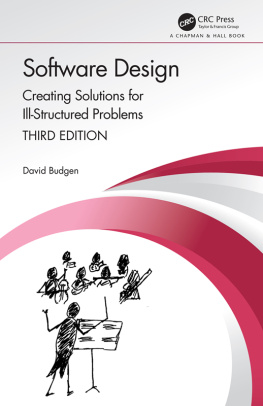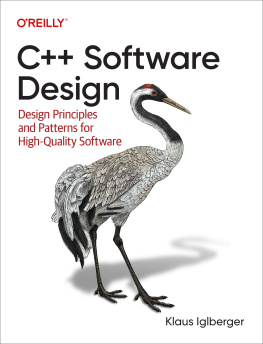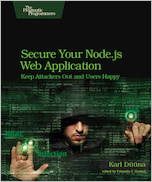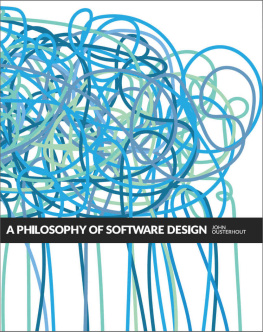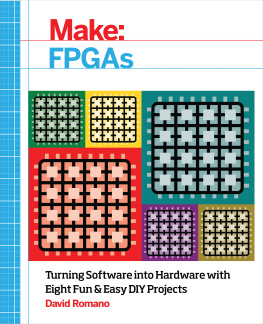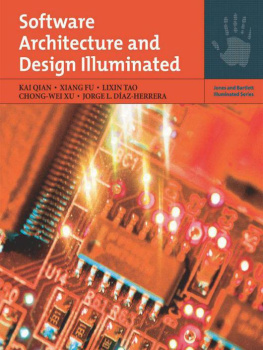David Budgen - Software Design
Here you can read online David Budgen - Software Design full text of the book (entire story) in english for free. Download pdf and epub, get meaning, cover and reviews about this ebook. year: 2020, publisher: CRC Press LLC, genre: Romance novel. Description of the work, (preface) as well as reviews are available. Best literature library LitArk.com created for fans of good reading and offers a wide selection of genres:
Romance novel
Science fiction
Adventure
Detective
Science
History
Home and family
Prose
Art
Politics
Computer
Non-fiction
Religion
Business
Children
Humor
Choose a favorite category and find really read worthwhile books. Enjoy immersion in the world of imagination, feel the emotions of the characters or learn something new for yourself, make an fascinating discovery.
- Book:Software Design
- Author:
- Publisher:CRC Press LLC
- Genre:
- Year:2020
- Rating:3 / 5
- Favourites:Add to favourites
- Your mark:
- 60
- 1
- 2
- 3
- 4
- 5
Software Design: summary, description and annotation
We offer to read an annotation, description, summary or preface (depends on what the author of the book "Software Design" wrote himself). If you haven't found the necessary information about the book — write in the comments, we will try to find it.
Software Design — read online for free the complete book (whole text) full work
Below is the text of the book, divided by pages. System saving the place of the last page read, allows you to conveniently read the book "Software Design" online for free, without having to search again every time where you left off. Put a bookmark, and you can go to the page where you finished reading at any time.
Font size:
Interval:
Bookmark:

Software Design
Richard LeBlanc
Seattle University, Washington, USA
This series covers all aspects of software engineering and software development. Books in the series include innovative reference books, research monographs, and textbooks at the undergraduate and graduate level. The series covers traditional subject matter, cutting-edge research, and current industry practice, such as agile software development methods and service-oriented architectures. We also welcome proposals for books that capture the latest results on the domains and conditions in which practices are most effective.
Introduction to Combinatorial Testing
D. Richard Kuhn, Raghu N. Kacker, Yu Lei
Software Test Attacks to Break Mobile and Embedded Devices
Jon Duncan Hagar
Software Essentials Design and Construction
Adair Dingle
Software Metrics A Rigorous and Practical Approach, Third Edition
Norman Fenton, James Bieman
Computer Games and Software Engineering
Kendra M. L. Cooper, Walt Scacchi
Evidence-Based Software Engineering and Systematic Reviews
Barbara Ann Kitchenham, David Budgen, Pearl Brereton
Engineering Modeling Languages Turning Domain Knowledge into Tools
Benoit Combemale, Robert France, Jean-Marc Jzquel, Bernhard Rumpe, James Steel, Didier Vojtisek
Speed, Data, and Ecosystems Excelling in a Software-Driven World
Jan Bosch
Introduction to Software Engineering, Second Edition
Ronald J. Leach
Software Design, Third Edition
David Budgen
For more information about this series, please visit: https://www.routledge.com/Chapman--HallCRC-Innovations-in-Software-Engineering-and-Software-Development/book-series/CHCRCINNSOFEN
MATLAB is a trademark of The MathWorks, Inc. and is used with permission. The MathWorksdoes not warrant the accuracy of the text or exercises in this book. This book'suse or discussion of MATLAB software or related products does not constitute endorsement or sponsorship by TheMathWorks of a particular pedagogical approach or particular use of the MATLAB software.
Third edition published 2021
by CRC Press
6000 Broken Sound Parkway NW, Suite 300, Boca Raton, FL 33487-2742
and by CRC Press
2 Park Square, Milton Park, Abingdon, Oxon, OX14 4RN
2021 Taylor & Francis Group, LLC
First edition published by Addison-Wesley 1993
Second edition published by Addison-Wesley 2003
CRC Press is an imprint of Taylor & Francis Group, LLC
Reasonable efforts have been made to publish reliable data and information, but theauthor and publisher cannot assume responsibility for the validity of all materialsor the consequences of their use. The authors and publishers have attempted to tracethe copyright holders of all material reproduced in this publication and apologizeto copyright holders if permission to publish in this form has not been obtained.If any copyright material has not been acknowledged please write and let us know sowe may rectify in any future reprint.
Except as permitted under U.S. Copyright Law, no part of this book may be reprinted,reproduced, transmitted, or utilized in any form by any electronic, mechanical, orother means, now known or hereafter invented, including photocopying, microfilming,and recording, or in any information storage or retrieval system, without writtenpermission from the publishers.
For permission to photocopy or use material electronically from this work, access
Trademark notice: Product or corporate names may be trademarks or registered trademarks and are usedonly for identification and explanation without intent to infringe.
Library of Congress Cataloging-in-Publication Data
Names: Budgen, David, author.
Title: Software design : creating solutions for ill-structured problems / David Budgen.
Description: Third edition. | Boca Raton : CRC Press, 2021. | Series: Chapman &Hall/CRC innovations in software engineering | Includes bibliographical referencesand index.
Identifiers: LCCN 2020037195 (print) | LCCN 2020037196 (ebook) | ISBN 9781138196612(paperback) | ISBN 9780367676568 (hardcover) | ISBN 9781315300078 (ebook)
Subjects: LCSH: Computer softwareDevelopment.
Classification: LCC QA76.76.D47 B83 2021 (print) | LCC QA76.76.D47 (ebook) | DDC 005.1dc23
LC record available at https://lccn.loc.gov/2020037195
LC ebook record available at https://lccn.loc.gov/2020037196
ISBN: 9780367676568 (hbk)
ISBN: 9781138196612 (pbk)
ISBN: 9781315300078 (ebk)
Typeset in Computer Modern font
by KnowledgeWorks Global Ltd.
To the late Jim Tomayko.
Historian, software engineer, teacher, sportsman, coach, aviator, author, family man, and an inspiring friend who had a huge heart for others, whatever their role in life.
Science is built up of facts as a house is built of stones, but an accumulation of facts is no more a science than a heap of stones is a house. Jules Henri Poincar (1854-1912)
When using this quotation to open the second edition of this book I observed that it is sometimes hard not to feel that our knowledge about how to design software might sometimes feel akin to having a heap of stones. We possess a collection of observations, techniques and experiences, but finding ways of putting them together to provide an organised corpus of knowledge about how to design software is something of a challenge. The first and second editions of this book have sought to gather, classify, categorise and interpret the available knowledge with the aim of providing some sort of structure that will help the reader to understand and use itand this one aims to do the same.
The ten years that elapsed between the first and second editions of this book saw the emergence of many new and sometimes radically different ideas about how we might go about designing software. The software designer's toolbox acquired concepts such as architecture and new forms of software technology such as software services; there was a move away from waterfall thinking with agile methods as well as with new forms of reuse through design patterns; and there was a greater standardisation of modelling forms with the Unified Modeling Language (UML).
In the (rather longer) period between the second edition and this one, although new ideas have continued to emerge, mostly they have been less radical in their scope. Perhaps this has been partly because software developers have also had to cope with significant changes in the context within which software design takes place. It is now increasingly the case that applications may well be developed by globally dispersed teams; make use of open source components; be in the form of product lines; need to operate within a global network of systems rather than in a purely local environment; and of course, increasingly need to cope with the possibility of malicious attacks. In addition, the growing availability of knowledge that is based upon empirical evidence is slowly giving us a better understanding of what works, when and why.
So, in order to keep the focus upon ideas about design, rather than being swamped with detail about software, this edition has been organised very differently to the previous two. In particular, the presentation of material about design has placed a much greater emphasis upon the role of design as related to the concept and characteristics of
Font size:
Interval:
Bookmark:
Similar books «Software Design»
Look at similar books to Software Design. We have selected literature similar in name and meaning in the hope of providing readers with more options to find new, interesting, not yet read works.
Discussion, reviews of the book Software Design and just readers' own opinions. Leave your comments, write what you think about the work, its meaning or the main characters. Specify what exactly you liked and what you didn't like, and why you think so.

